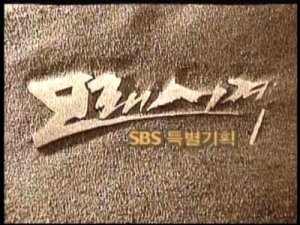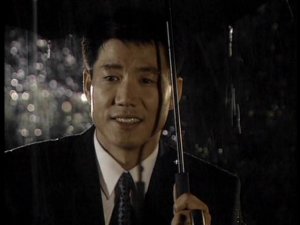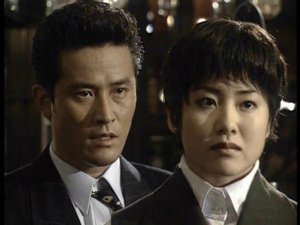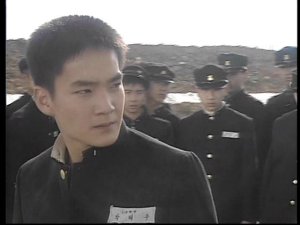| Reviews & Columns |
|
Reviews DVD TV on DVD Blu-ray 4K UHD International DVDs In Theaters Reviews by Studio Video Games Features Collector Series DVDs Easter Egg Database Interviews DVD Talk Radio Feature Articles Columns Anime Talk DVD Savant Horror DVDs The M.O.D. Squad Art House HD Talk Silent DVD
|
DVD Talk Forum |
|
|
| Resources |
|
DVD Price Search Customer Service #'s RCE Info Links |
|
Columns
|
|
|
Sandglass (SBS TV Series)

"[A sandglass] ends when the sand runs out from one side, just like our lives. There's an end to everything, no matter how great it may have been."
-President Yoon Jae-Yong
The Mini-Series
In the mid-1990s, 1995 to be exact, the citizens of the Republic of Korea were exposed to an epic drama about two friends who were fated to lead different lives and how their actions would be affected by the political turmoil the country faced. That drama was Sandglass. Set in the 60s, 70s, and 80s, the story incorporated fictional characters into real world events dealing with the political corruption that plagued the country. Sandglass features twenty-four episodes and approximately twenty hours of content that is powerful on an epic proportion.
In the first part of the series, the story focuses on getting accustomed to the lead characters and the important figures in their lives. Park Tae-Soo (Choi Min-Soo) and Kang Woo-Suk (Park Sang-Won) were two unlikely friends. During their high school days, Tae-Soo and Woo-Suk were not always friends. Tae-Soo was well-known for his fighting abilities and rarely focused on school. Woo-Suk was a bookworm who aspired to work in the Korean legal system. The two were as different as night and day. Despite, they eventually found great friendship in each other when Woo-Suk agreed to tutor Tae-Soo in preparation for college. While Woo-Suk helped Tae-Soo to study, they quickly became best friends.
The story continues to outline how their friendship endured despite taking different paths in life. Tae-Soo's best efforts were not enough to get him into college. He worked very hard with Woo-Suk to be a diligent student, but he was unable to get into college because of his deceased father's political affiliation. Without college as an option, Tae-Soo found himself going back to what he knew best, fighting. He becomes a minor gangster who attacks opposing political parties to sniff out the competition. Woo-Suk, on the other hand, continued to study hard and made it into law school.

While in law school, Woo-Suk meets a bright and energetic girl named Yoon Hye-Rin (Go Hyun-Jung) and Tae-Soo meets Hye-Rin through his good friend. Hye-Rin has her own troubled past, which comes from her family ties. Her father Yoon Jae-Yong is well-known as President Yoon, the Godfather of Casinos. He is a powerful businessman whose financial engagements are borderline legitimate. Hye-Rin came to college to get away from her father and try to find her own place in the world. She participates in a student political activist group that stands out against the political corruption in the country, of which her father is a part of.
In the second portion of the story, their lives start on an intertwining path with slight romance. Both Woo-Suk and Tae-Soo fall in love with Hye-Rin. However, the love triangle is not a huge part of the story. The main focus is on the different lives the three take and how they intertwine with each other and the current state of the Korean government. Tae-Soo's dirty is repeatedly used by his superiors to mold political elections to their liking and he also rises to become a mid-level crime lord in Seoul. Woo-Suk continues his studies, but loses his confidence and joins the military to serve out his mandatory service requirement. The story also follows Hye-Rin finding herself in midst of all the corruption. Her participation as a student activist becomes another important aspect to this portion of the storyline. She and her colleagues become targets by the government.
This portion of the story also incorporates real world events that detail the country's corruption. The massacre of Gwangju is a tragic event, where innocent civilians were murdered by the Korean military for standing up against their oppression. Both Tae-Soo and Woo-Suk get caught up in it, with Tae-Soo standing by the civilians and Woo-Suk serving in the military. It is a very emotional part of the story and the character development from both main and supporting characters is done very well. There is also a look into the concentration camps individuals were placed in for defying the government and the interrogation methods used to break activists.
In the final portion of the story, Woo-Suk becomes a prosecutor, fighting for justice and what he believes is the right thing, while confronting his emotions about his military service. Tae-Soo rises to one of Seoul's most powerful criminals. Hye-Rin is caught in the midst of it all, as she wants to live her life righteously, but cannot keep away from her father's way of life. Soon the three lives intersect, as opposing forces that cannot coexist. Woo-Suk takes on a case dealing with political corruption. His investigation puts him in a situation where he must not only question criminals but his superiors in government. And the government wants him silenced. The case takes him into a massive case of corruption and even ties in his friends.

Throughout the mini-series a variety of supporting characters are introduced. Their roles to the overall story are very important. Baek Jae-Hee is a young gangster who saved Hye-Rin's life when she was in middle school. Since that day, he has dedicated his to protecting her. The somber love he has for her is heartwarming and moving. He rarely says anything, but his unspoken performance is powerful. Jin-Soo is Tae-Soo's former bodyguard and friend. He left Tae-Soo's service to help his mother open a restaurant. He is a key character in the events of the Gwangju massacre. Lee Jong-Do is Tae-Soo's buddy from high school. He is part of Tae-Soo's gang and always on the look out to move up in the criminal world. Jong-Do is the kind of character you despise, yet pity at the same time. Other minor, but important characters include Sun-Young, who is Woo-Suk's landlady and bride-to-be, Young-Jin, an eager journalist who has her eye on Woo-Suk, and Young-Jae, Hye-Rin's brother who is more interested in peace of mind than power and money.
Exciting is the not the world I would use to describe the story of Sandglass. The show has a somewhat somber, dark mood underneath it. But Sandglass is engaging, compelling, and gripping. The storyline and the characters involved are developed in such a way that over the course of the show's twenty hours they become vividly alive. With each episode, you will find yourself sucked in and wanting to see what happens next.
However, while I praise Sandglass, there are some dry spots. I loved the cast. I thought the performances were topnotch and the characters were developed more than sufficiently to really get to know them. However, Hye-Rin was a mixed bag. At times, she tended to be a very whiny and annoying. As for the story, it was strong for the most part. There were a few portions that felt like it dragged on longer than needed (the initial political state setup, student activists, concentration camp, and the courtroom case at the end). But the dry spots were not terrible enough to ruin the experience.
Overall, Sandglass is an engaging drama that never quits. The storyline thoroughly introduces three primary characters and several supporting with character development that is handled well and offers the characters in a way one can easily get to know, like, and understand. The actors and actresses handle their roles with skill and they did a great job projecting their emotions as they struggled through the good and bad. As for the story, it is an epic drama that everyone should witness. While there are some dry spots (with content running longer than necessary), it makes for an experience you will not forget. In the end, Sandglass offers twenty hours of compelling television and I highly recommend it.

The DVD
The mini-series Sandglass is made up of twenty-four episodes that span eight dual-layered DVDs (DVD-9). The box cover claims there is approximately twenty-four hours of content, however there is not twenty-four hours. Each DVD has roughly two and a half to three hours of content and it adds up to twenty hours and nine minutes.
The DVDs are stored in two DVD cases that each holds four discs. The individual cases are approximately two times the size (spin width) of a regular DVD keep case. The DVD cases are housed in a thin cardboard case.
Video:
The video is given in 1.33:1 ratio full frame color. The picture quality is not great. It is comparable to a slightly degraded VHS tape. There are noticeable visual distortions and some problems with color representation. The visual distortions appear to be problems with the source medium and not due to video compression or bad authoring. The picture was clearly captured on film and it looks like the film degraded slightly. As for the colors, because of the lack of clarity, some of the color representations do not look right. Overall, I was quite displeased with how the video looked. But despite the glaring visual problems, the mini-series is still viewable and it shouldn't ruin the experience.
Audio:
The audio track supplied is in Korean 2.0 Dolby digital stereo sound. The dialogue comes off a little flat and some of the soft spoken actors/actresses are a bit hard to hear. But the track is generally audible for most characters. The music sounds decent and it is played during the most dramatic moments. The problem I had with the music is that they re-used the same couple of tracks throughout the entire mini-series.
For non-spoken language options, there are subtitles in English provided. There are a few grammatical errors, but for the most part the subtitles provided dialogue that was very easy to follow.
Extras:
There are no extras included with this release.
Final Thoughts:
Sandglass is a compelling drama about the lives of three individuals in a country with a corrupt political system and how their lives were fated to intersect. The story provides twenty hours of engaging content with superb character development, topnotch acting performances from its main and support cast, and well-written storylines. In the end, Sandglass is a gripping drama that deserves to be watched. It comes highly recommended.
|
| Popular Reviews |
| Sponsored Links |
|
|
| Sponsored Links |
|
|
| Release List | Reviews | Shop | Newsletter | Forum | DVD Giveaways | Blu-Ray | Advertise |
|
Copyright 2024 DVDTalk.com All Rights Reserved. Legal Info, Privacy Policy, Terms of Use,
Manage Preferences,
Your Privacy Choices | |||||||














